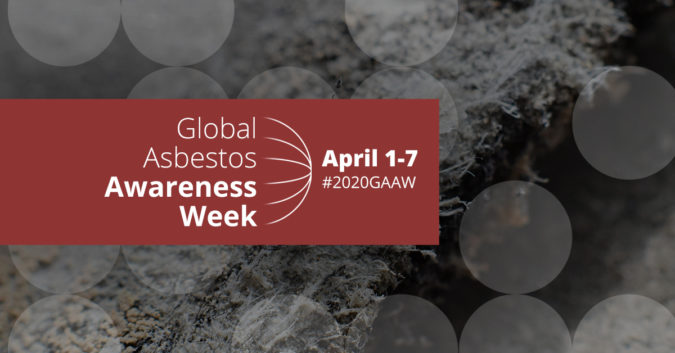The year 2020 marks the 16th annual Global Asbestos Awareness Week (GAAW), which takes place between April 1 – April 7.
For 15 consecutive years, the first week of April has been a special time for advocates, scientists, doctors, and victims and their families to come together to share new medical knowledge, plan future legislative efforts, and provide community and support for those impacted by diseases caused by asbestos.
For each of the last 15 years, GAAW has been accompanied by an annual International Asbestos Awareness and Prevention Conference hosted by the Asbestos Disease Awareness Organization (ADAO). In past years, the conference has proven to be a great success in both promoting legislative action and acting as a beacon of hope for so many Americans in the asbestos-prevention community.
This year, the awareness aspects of GAAW will continue as planned, but sadly the International Asbestos Awareness and Prevention Conference has been postponed due to the COVID-19 pandemic.
While current social-distancing practices may stop people from physically coming together to fight their common enemy — asbestos — it will not stop people from supporting the awareness week through other means. This year, GAAW and all of its supporters will take the fight for a healthier, safer, and asbestos-free America online — in a bigger way than ever before.
Why GAAW Is So Important
It’s a common myth: Asbestos is banned.
While that may be true for nearly 70 countries around the globe, asbestos very much remains legal in the United States today. In fact, American imports of raw asbestos doubled in the year 2018 to more than 750 metric tons. Add this to the whopping total of legacy asbestos still present in older factories, schools, and buildings, and it becomes painfully clear that America still has a major asbestos problem.
Each year, thousands of Americans die from diseases linked to asbestos, such as mesothelioma — a lethal cancer caused exclusively by asbestos. For those who have been exposed to asbestos, the risk of developing mesothelioma is lifelong. The World Health Organization (WHO) has consistently stated that there is no safe level of asbestos exposure.
The non-profit Environmental Working Group (EWG) estimates that 12,000-15,000 Americans die each year from a preventable asbestos-related disease. Another study announced by ADAO puts the annual death toll near 40,000 Americans, which would place asbestos within reach of the top-10 causes of death in America, just after kidney disease and influenza.
While many in the industries that support asbestos know these facts, they still lobby members of Congress to maintain the status quo. Simply put, to many companies that support the continued use of asbestos, it is a choice between human lives and short-term profits — and they choose profits every time.
If an asbestos ban were enacted in the United States, it could save tens of thousands of Americans from needless disease and premature death.
Bringing awareness to these sobering facts is the purpose of GAAW. It takes strong awareness campaigns like GAAW to build momentum behind such vital and necessary changes.
Shifting Advocacy Online: #2020GAAW
In support of GAAW’s virtual campaign this year, Sokolove Law will be releasing a series of videos — one video for each day of GAAW. These videos strive to educate and bring awareness to the scourge of asbestos and its troubled history in the United States.
We will be making these videos available online through our social media channels, so be sure to follow our Facebook and Twitter pages.
The COVID-19 pandemic has changed everything, but it will not stop the ADAO and GAAW’s supporters and sponsors from connecting with the men and women who need information, resources, community, and, above all, help.
This Global Asbestos Awareness Week, stay up to date, follow new developments, and share your story using the hashtag #2020GAAW.
